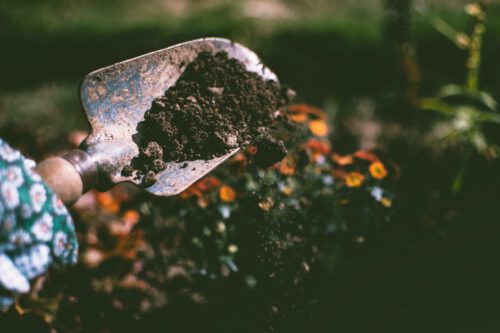What is potting soil?
Potting soil is a specialized product, intended for sowing and cuttings; ideal for professional growers. So it's not really intended for the average gardener at all, and certainly not as general garden soil! In fact, potting soil contains hardly any nutrients, because young seedlings and cuttings actually thrive in nutrient-poor soil. A mature plant, on the other hand? It needs nourishment! That's why it's much wiser to fill gardens with garden soil and fertilize it annually with leaf compost or compost made from your own vegetables, fruit, and garden waste.
And what if you want wildflowers or native plants? They often don't need rich soil at all. They want neither garden soil nor potting soil! They thrive in poor soil without fertilizer.
Buying a plant from the nursery? Forget that bag of potting soil. Want to sow your own seeds? Buy peat-free potting soil. Or better yet, make your own! Still buying it? Use it sparingly and choose small pots or plug plants so you need as little as possible.
Beware of misleading labels! And "organic" doesn't always mean peat-free!
Think you're doing the right thing by buying organic potting soil? Unfortunately, that doesn't say anything about the presence of peat! Many eco-labels give the impression you're making a sustainable choice, while the potting soil is actually full of peat.
If a potting soil is not explicitly labelled as peat-free, you can be almost certain that peat is the main ingredient. Even in products with green packaging and labels like organic, eco, or sustainable, peat often remains the base. Only the European Ecolabel guarantees that a product is truly peat-free. Other certifications still allow high percentages of peat.
In short: don't be misled by fancy terms and green logos. Always check the packaging for "peat-free" or check the ingredients list—that's the only way to be sure you're doing it right!
Turfvrije (=veenvrije) potgrond op de Nederlandse markt
If you're not a professional grower but do want to sow seeds and take cuttings, our advice (based on personal experience) is to simply use peat-free garden soil. If you do want to use potting soil, fortunately, there are peat-free alternatives available. Here's a list of sustainable options for you:
- Innogreen sells peat-free potting soil with a bit of cocos.
- DCM seels peat-free potting soil.
- Bio-Kulturawatch out! Bio-Kultura potting soil is not peat-free! Their garden soil is completely peat-free and suitable for sowing and cuttings.
- Ecotuintje offers peat-free, organic, and vegan soil, as well as coconut and peat-free growing pots.
- Fertila Biologische Potgrond – 100% peat-free, available online via Abbing nursery in Zeist (delivers near Zeist).
- Organic nutrition centre sells potting soil based on leftovers from mushroom cultivation.
- Tardy offers natural compost (available in Castricum from Alkmaar)
- Pokon has a peat-free waterproof planting soil containing cocos.
- Kwekerij Hessenhof sells leaf compost.
- Holsto Tuinen & Buitenleven sells peat-free potting soil.
Although there are some alternatives based on coconut fibre or coir, we must acknowledge that these are not free of problems, such as transport costs, plantations on former rainforests, and sometimes even child labour. Their total ecological impact is still considerably lower than that of peat, but not as ideal as the above-mentioned options (Read more). That is why we have chosen not to include products with coconut as the main ingredient in our list.

Make your own potting soil
You can also easily make your own potting soil.
Recipe:
Mix four parts garden soil (preferably sandy loam), four parts compost, and two parts coarse sand or river sand. Compost provides structure and fertilizer to the potting soil.
Adjustments to your soil type:
If you are gardening on clay soil, add some extra sand. For sandy soil, replace the extra sand with leaf compost. If you want a more airy mix, you can add leaf compost.
Get Active!
Ask your local garden center to have peat-free products on their shelves. You can make a big difference!
